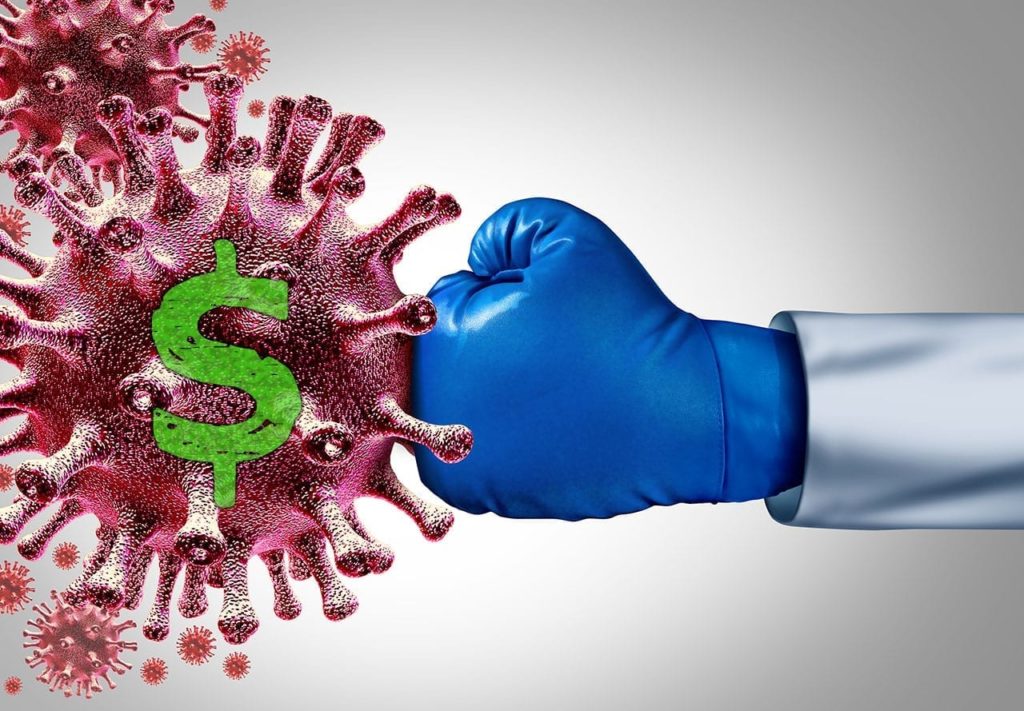Over 23.5 million people in the United States are addicted to drugs and alcohol. That’s basically the entire population of Texas.
Now, after over 6.6 million people filed for unemployment last week, experts are concerned that the influx of finance-related anxiety lurking in the background of the novel coronavirus pandemic will worsen the rate of addiction in the United States. At the same time, financial insecurity poses a higher risk of relapse for those already in the recovery community.
Avoiding relapse is already tough for those treading through the process of substance abuse recovery. With the increased risk of other relapse triggers like isolation or getting stuck at home with toxic family membersduring the novel coronavirus outbreak, addicts and alcoholics must find ways to cope with the anxiety of “not having enough.”

Financial insecurity poses a higher risk of relapse for those in the recovery community. But there are ways to avoid succumbing to fear if you are a recovering addict. Hotel California by the Sea’s got your back. Take a look at our information on financial insecurity (and how you can combat it) during the economic fallouts of COVID-19.
What Is Financial Insecurity?
Financial insecurity is the basket of torturous emotions that plagues addicts and alcoholics (and all people) with fears of not having enough fiscal cushion to survive. But where does financial insecurity start?
We have a little surprise for you: financial insecurity isn’t actually dictated by external events. It starts on the inside.
Sure, external factors like a job loss or sudden pay cut might prompt finance-related anxiety to rise up to the surface of your consciousness. Still, financial insecurity actually comes from an ingrained internal dialogue about your financial situation and the choices you have when you’re strapped for cash.
To shift your anxious mindset and avoid relapse on drugs or alcohol during financial stress, you’ve got to start with the stories you tell yourself about abundance, prosperity, and faith.
But first, let’s take a look at the extent to which financial insecurity can put recovering addicts at risk for relapsing on their drug of choice.
How Financial Insecurity Affects Substance Abusers
43% of people report feeling financially insecure in the United States. With more layoffs than usual (and that’s an understatement), the number of people that feel financially insecure will likely rise.
Financial insecurity impacts explicitly those with substance abuse issues. One study on job loss and addiction by the organization Current Drug Abuse Reviews actually measured the correlation between unemployment (therefore an increased likelihood of financial insecurity) and substance abuse.
This study revealed three pretty crazy facts within their sample pool:
- Binge drinking and the use of other illicit substances is more prevalent among the unemployed population (by a long shot.)
- Those who are unemployed are more likely to be clinically classified as substance abusers.
- Unemployment “increases the risk of relapse after alcohol and drug addiction treatment.”
43% of people report feeling financially insecure in the United States. With more layoffs than usual (and that’s an understatement), the number of people that feel financially insecure will likely rise.
Financial insecurity impacts explicitly those with substance abuse issues. One study on job loss and addiction by the organization Current Drug Abuse Reviews actually measured the correlation between unemployment (therefore an increased likelihood of financial insecurity) and substance abuse.
This study revealed three pretty crazy facts within their sample pool:
- Binge drinking and the use of other illicit substances is more prevalent among the unemployed population (by a long shot.)
- Those who are unemployed are more likely to be clinically classified as substance abusers.
- Unemployment “increases the risk of relapse after alcohol and drug addiction treatment.”

With these findings in mind, patients in drug or alcohol treatment centers or those already walking through the addiction recovery process must tread carefully during our current economic upset. Drug and alcohol rehabilitation centers also must focus on equipping their clients with the coping skills necessary to handle financial insecurity during an impending recession.
Luckily, there are a few ways to prevent your financial fear from derailing your sobriety, and we’ve listed them here just for you!
1. Understand The 5 Stages Of Relapse
Relapse, contrary to popular belief, usually isn’t a spontaneous decision. Instead, a relapse can often be spotted far before anyone physically picks up a drink or a drug (often called the “relapse before the relapse.” in recovery communities)
The Yale Journal of Biology and Medicine identifies 3 stages of a relapse. These stages include:
- Emotional relapse
The emotional relapse is a stage in the relapse process that doesn’t actually involve thinking about drugs or alcohol (or at least, not consciously.) The typical indicators of emotional relapse include lying, bottling up emotions (or not sharing their feelings in support groups), trying to control how others think. Other signs include poor eating or sleeping habits and social isolation.
- Mental relapse
Here’s when thoughts of using start entering a recovering addict or alcoholic’s mind. Usually at this stage, people in recovery begin weighing the pros and cons about using and experience substantial cognitive dissonance about whether to relapse or not.
At this stage, cravings and urges to use drugs or alcohol may begin again, glorifying past drinking or drug use might start, and denial or minimization about prior consequences of substance abuse might begin.
Despite the fact that a mental relapse might not bear the often dangerous and immediate effects of a physical relapse, a mental relapse can be equally as torturous. Cognitive Behavioral Therapy and other means of mental health and addiction treatment can help identify these maladaptive cognitive processes before they lead to physical relapse.
- Physical Relapse
A physical relapse is when an addict or alcoholic finally begins using again, and things can get pretty messy once an addict picks up a drink or drug. As soon as an addict or alcoholic consumes even a small amount of their substance of choice, their addiction tends to return directly to the severity level the recovering addict left it at before getting sober.
Recovering addicts and alcoholics can stop the “relapse before the relapse” in its tracks by sharing about it in twelve-step meetings or seeking mental health counseling. If recovering substance abusers stay aware of the early cognitive signs of an impending relapse, they are much more likely to prevent the common physical relapse that follows.
2. Determine What You’re In Control Of
A substantial amount of anxiety comes from feeling “out of control” of your circumstances at any point in time. So, determining what you can control in stressful financial situations makes coping with their uncomfortable emotions much more comfortable.
In a journal or on your phone, list some of the things you can control during an economic crisis.
Here are a few examples:
- Participation in support groups and other twelve-step programs, like alcoholics anonymous
- Identifying the signs of relapse (or impending relapse) like what is mentioned above
- Filing for unemployment or other government assistance programs
- Reaching out to loved ones for support
- Seeking substance abuse treatment at an accredited treatment center if you’ve already relapsed
- Maintaining your physical health
- Caring for your mental health
- Identifying your triggers for relapse
- The people you surround yourself with
Remembering what you can and can’t control in an anxiety-provoking situation, especially a financial one, can help prevent someone from relapsing on their drug of choice.
3. Redefine “Enough”
A massive chunk of financial insecurity lies in feeling like you won’t have “enough” to get by. So, we challenge you to shift your inner dialogue and redefine what “enough” means to you!
Change is uncomfortable, but taking a financial cut doesn’t always mean you won’t survive presently trying times. Sometimes, it simply means cutting back on unnecessary spending for a period of time.

However, if you don’t have enough money for food, rent, shelter, or healthcare during the novel coronavirus pandemic, it might be time to utilize government resources or put your pride aside and ask for a little help from friends and family. Either way, a strong support network will help you navigate through economic insecurity.
The truth is, even if you do lose a large sum of monthly income, if you still have your sobriety, things will be okay. Sobriety teaches you faith and enables you to interact with a dense support network that can coach you through fear, pain, and struggle during an economic crisis.
4. Stick to Your 12 Steps
Taking a personal inventory, calling your sponsor, praying to your higher power, and diligently working your 12 steps can help you cope with the fear that flows below financial insecurity. In fact, a large part of relapse prevention for many people lies in the ability to stay connected with other positive, sober people.
The beautiful aspect of working the 12 steps through alcoholics anonymous, narcotics anonymous, or other support groups is that they help you identify where fear may be trumping faith in your daily life.
5. Seek Treatment
If worse comes to worse, seek addiction treatment for your mental, emotional, or physical relapse. Or, reach out for help if you’re in recovery from addiction and feel yourself experiencing relapse-related thoughts or inching closer to a physical relapse.
Remember, relapse will only make the consequences of financial insecurity worse in the long run, despite the allure of “feeling better” in moments of stress or fear. If you can utilize some of our tips for dealing with financial insecurity and shifting away from a fear-based perspective, it’s very likely you’ll be able to prevent a physical relapse.
All in all, remember you are never alone. Share this article if you resonated with any of our tips for preventing relapse on drugs and alcohol during the novel coronavirus outbreak.
Contact our addiction professionals today if you’ve relapsed on drugs or alcohol due to financial consequences of COVID-19 (or for any reason whatsoever) to learn more about your treatment options. Both inpatient treatment and outpatient treatment programs for substance use disorders are still open across the US, including Hotel California by the Sea.
And last but not least… Remember that Hotel California by the Sea is always here for you!
